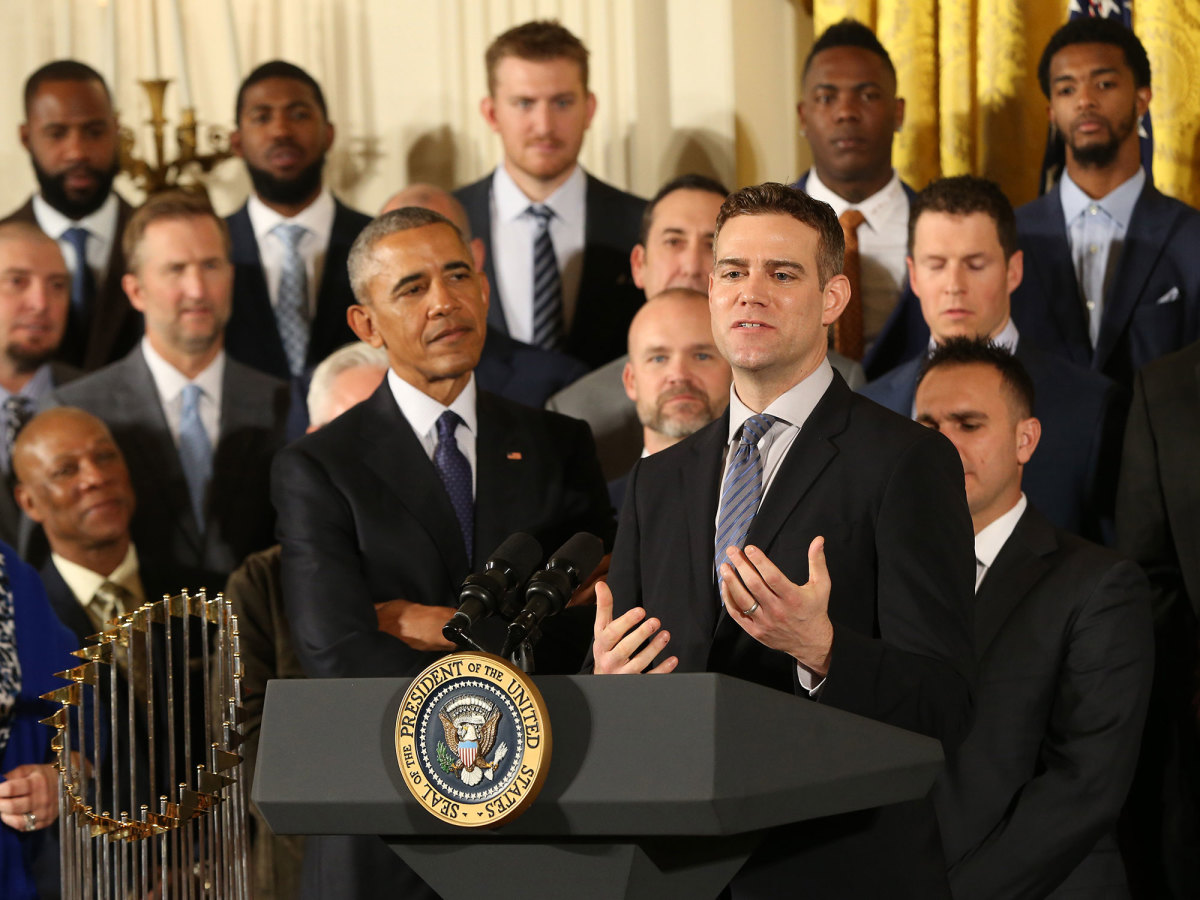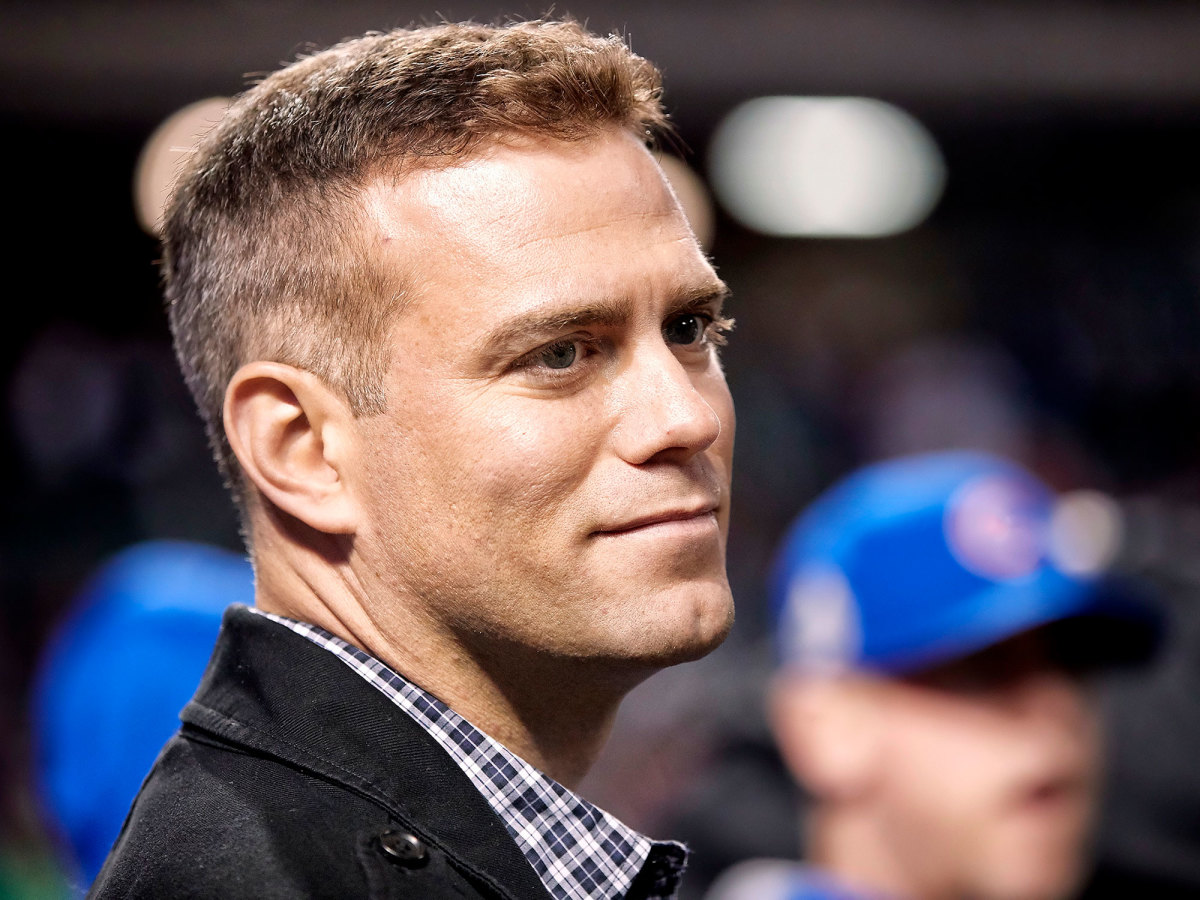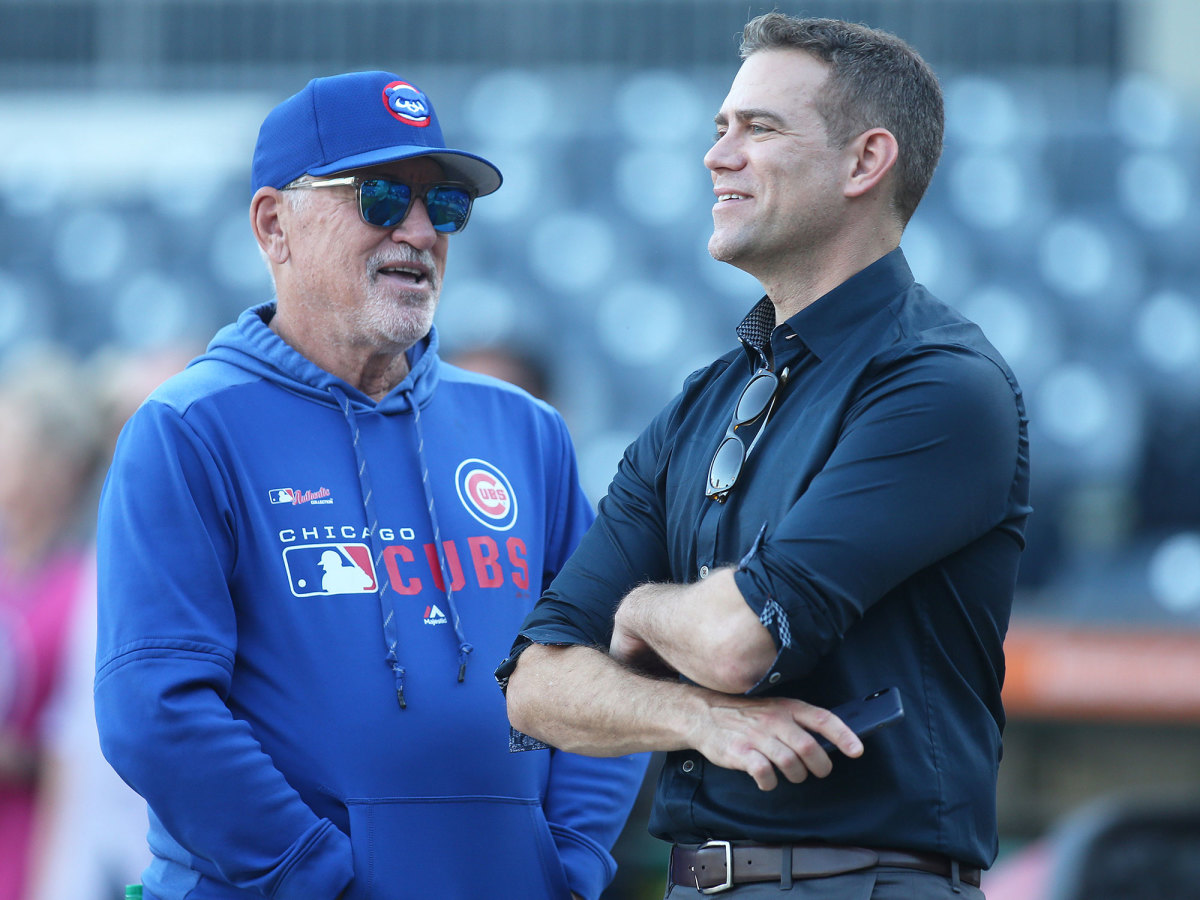Theo Epstein Leaves Cubs With a Ring—and His Mind Made Up
The minute I heard Theo Epstein walked away from his role as president of baseball operations of the Cubs, I texted him a quote from Abraham Lincoln: “Folks are usually about as happy as they make their minds up to be.”
Epstein is leaving on his own accord with a year left on his contract, which would have been his 10th season with the Cubs. It echoes nearly precisely his arc in Boston: leaving on his own accord with one year left on his contract, which would have been his 11th year with the Red Sox. A devotee of the Bill Walsh theory that a decade in one place drains energy and impact from leadership, Epstein told Cubs owner Tom Ricketts and general manager Jed Hoyer he preferred to leave now rather than oversee a year of transition. The uncertainty of COVID-19 and the impending end of the Cubs’ window with this group of players told him now was the time to give Hoyer the runway to work unencumbered.
I thought about the observation from Lincoln because I knew Epstein had made up his own mind that he would be happy leaving now.
“Feel great,” he texted back. “Tom, Jed and I are totally aligned, the rare peaceful transfer of power.”
In his open letter Tuesday addressed to “Cubs Friends,” Epstein made clear he needs his first summer away from a ballpark in 30 years to spend time with family and nonprofits. He needs a reset. After that, he intends to return to what he called his “third chapter” in baseball, preferably as part of an ownership group.
Epstein always has harbored big ideas with an eye toward social and civic impact. In our conversations over the years he has thought out loud about what might come next for him, be it politics or an NGO. But over time, and especially by ending two of the three longest World Series championships droughts ever, he has come to understand intimately how baseball, this simple little game cast as a diversion from seriousness, can be an agency of profound change.
“I have seen first-hand the profound impact a baseball team, especially a championship team, can make on its community,” he wrote, “and how team owners can become important forces for civic good.”

Three weeks after the Cubs won the 2016 World Series, I sat with Epstein over lunch at a Wrigleyville café, where his money was no good. He told me the idea of winning with the Cubs germinated in him soon after winning the 2004 World Series with the Red Sox. It was a window into this understanding of the game’s profound power.
“As far back as the aftermath of the ‘04 World Series I would talk about it with my friends a little bit,” Epstein said. “ ‘If I ever move on, the Cubs would be the one spot because it was so powerful to win in Boston.’ The whole aspect of the job was seeing how much it resonated with people and families. You never let go of that. It adds meaning to the whole thing. I would joke around with friends–I remember telling Jed after ’04—but it was also sort of a pipe dream, because I was focused on Boston.”
He ran smack into the Walsh theory in Boston. In the summer of 2010, in his ninth season in Boston, Epstein had an epiphany at the funeral of a longtime Red Sox employee. The deceased was buried in a Red Sox casket. Prayer cards contained the Red Sox logo. Epstein began to think, I really don’t want this to be me.
“Because when you’re not unconditionally in love with a place anymore, I think you resent to a certain extent the degree to which you’re identified with that place, or you self-identify with that place,” he told me a few years ago.
He created distance between himself and the Boston identity. As the Boston GM, he said, he took “the easy way out” that winter by writing checks worth $296 million for Adrián González and Carl Crawford, a signal that he was losing his nimbleness and creativity as an executive. The next spring, he told owner John Henry he was ready to turn the team over to Ben Cherington. The team lost 20 of its last 27 games that season. Ricketts showed up with perfect timing and the perfect escape hatch for a stale Epstein: the job in Chicago.
One thing you must understand about Epstein, and why his creative alarm clock goes off after about 10 years in one place, is that he is intense about being a collaborative builder. He is the most important baseball figure of this young century. It is not just because he is smart. It is because he is driven and because he delivered championships. He is not the architect of theory but of best practices that won actual titles. He knows what he does not know, and not only surrounds himself with front office talent but also empowers them to contribute and fill in the gaps.
The game you see today is the game Epstein helped birth, though he never saw it going this far down the rabbit hole of analytics that it has lost much of its soul in a relentless, clinical pursuit of efficiency.
The job has gotten bigger, more complicated, more demanding. Epstein never was the type to be simply an overseer, not even after winning championships in 2004, 2007 and 2016. He was on the road scouting amateur players. He was taking losses hard and finding the room for improvement in victories.

One of the best untold stories about his intense competitive edge happened in Game 7 of the 2008 American League Championship Series at Tropicana Field. Jon Lester, then 24, was pitching for Boston against Tampa Bay. Epstein noticed that the radar gun readings posted on the scoreboard were well below Lester’s typical velocity readings. Epstein saw it as gamesmanship—a way for the home team to try to get inside a young pitcher’s head with doubt. Epstein marched into the scoreboard control booth and confronted the young man at the controls.
“You throw one more fake number up there,” he warned, “and I’ll take that console and shove it …”
Epstein started out in the front office of the Padres, with a seat between the team’s scouting director and its one sabermetric analyst. They hated each other. He was Switzerland. Information was so crude back then the Padres prepared for the 1998 draft without a single statistic. It bothered Epstein that the team didn’t know whether a college player they were considering was hitting .400 or .250. Two days before the draft, Epstein told an intern to call every major college program and have the sports information director fax over the team statistics.
In the war room on draft day, as the Padres' decision-makers began to identify their picks, Epstein, armed with his faxes, would pipe up, “Are you sure we want this guy? He’s got a five and a half ERA and more walks than strikeouts. Why are we talking about him in the first round?”
He was 25 years old. He was looking at the game with fresh eyes. He craved information.
Epstein joined the Red Sox in 2002 under GM Mike Port. Epstein was just one of a cadre of whip-smart young assistants and interns who turned the back room at the Fenway offices into a fraternity. It was freewheeling and creative, the antithesis of how the old guard was running the place. Port used a typewriter. He would tap-tap-tap out reports, clacking keys and throwing the carriage return when the bell sounded. When Billy Beane changed his mind and turned down the GM job offered by Henry, Epstein got the job.
“The old guys were horrified I got the job,” he once told me. “Our organizational mantra from the very beginning was ‘We don’t know [bleep].’ Once you accept that, you’re a step ahead. We try to get our best scouts have the best looks and more looks against better competition, more makeup information, the best medical information, the best statistical information. You do all that and you still realize it’s a virtually impossible task.”
He knew what he didn’t know. One of his first hires was Bill Lajoie, an old baseball man who built the last championship team in Detroit in 1984. It wasn’t just a symbol. It was a direct admission that Epstein believed in a holistic approach to baseball, not one bound entirely by numbers.
Before his first draft as Red Sox GM, Epstein told Lajoie about how the Padres would rank as many as 200 players before the draft, sweating over fine-line distinctions about who should be ranked, say, 156 and who should be 157.
“And then,” Epstein told Lajoie, “there are players who should be first-rounders because they have first-round tools, but your area guy who knows him best doesn’t really like the player or your cross checker doesn’t feel he’s a fit in your organization, for makeup or whatever reason. ‘He’s got first-round stuff but his arm doesn’t get up on time’ or he has some flaw that for you detracts from his value. It’s real tempting to look past that flaw or the one scout who doesn’t like him and still take him. What did you do?”
Said Lajoie, “Screw it. Just focus on the guys you’re really excited about. Go with the guys you’re on early and have the most history on and screw the guys who pop up late and you don’t know anything about. The guys you’re excited about, put them on your board, move them up on your board and the guys who should be up there for some reason you can’t get excited about, don’t spend time with them. You’re not going to take them. Twenty-nine other teams are going to take them.
“That year we took [Alan] Trammell and [Lou] Whitaker, we ranked only 20 guys. We got 12 of our 20. Don’t worry about taking a guy who should be a seventh rounder in the fourth. Get the guys that you like, it doesn’t matter if it’s the seventh or the fourth.”
Epstein ran highly successful drafts in Boston. He also commissioned an organizational manual of how he wanted the Red Sox to play and teach baseball. It also was his first order of business when he joined the Cubs.

By the time Epstein reached Chicago, the rest of baseball was chasing numbers to find inefficiencies. So Epstein zagged while they zigged. He built a championship team by emphasizing the character of position players, who impacted the team concept more than pitchers: Anthony Rizzo, Kris Bryant, Kyle Schwarber, Jason Heyward, Albert Almora, David Ross, Dexter Fowler, et al.
His proudest moment was when he walked past the visiting team weight room at Progressive Field during the ninth-inning rain delay of 2016 World Series Game 7. Epstein was on his way to meet with MLB officials about a weather update. As he passed the weight room, Epstein saw his players gathered for an impromptu meeting. In a moment of crisis—the Cubs had blown a three-run lead with the World Series in hand—his players bonded together to pull each other up. It had nothing to do with numbers. It had everything to do with what makes a championship team.
When Epstein first took the Boston job, he believed he could find winning mostly in the numbers—just cobble together guys who got on base and hit for power, and damn how the pieces fit. By the time he joined the Cubs, especially after the September collapse of 2011 in Boston, Epstein came to understand he had underestimated the human element.
“The biggest surprise for me as a GM is you spend more time as a psychologist than you think,” he once told me. “Behind every failure is almost always an emotional or psychological factor that is very real—a latent injury or latent psychological injury behind almost every underperforming player. If you can find it and address it, it’s a huge advantage.
“That’s the number-one competitive advantage. It is the human resource: the instructors and coaches. They get it. They bond with the kids. They care about them. They put themselves last. That’s huge.”
I told Epstein that it sounded like the art of great education. To be a great teacher is to understand the student, not just the material.
Said Epstein, the son of a creative writing professor, “It’s the exact same thing.”
The list of influential baseball executives who learned under Epstein is a mile long. Hoyer, Cherington, Jason McLeod, Mike Hazen, Josh Byrnes, Jared Porter, Amiel Sawdye, Brian O’Hallaran, Scott Harris, David Chadd, Peter Woodfork, Allard Baird, Craig Shipley … etc. The relationships were reciprocal. Epstein learned from them.
Professor Epstein’s son always is learning. That will not change. It is in his DNA to expand his mind, and as the adage goes, once expanded a mind never snaps back to its original form. He is only 46 years old. After a year on pause, he will need another challenge, another platform to instigate change for the better. It may take getting a piece of a team the next time to bring him back. When it happens, and it will happen, he will do what he did today: make up his mind to be happy.
